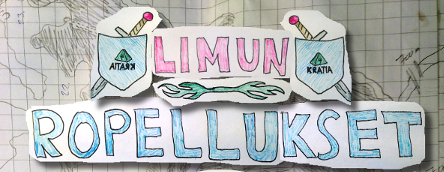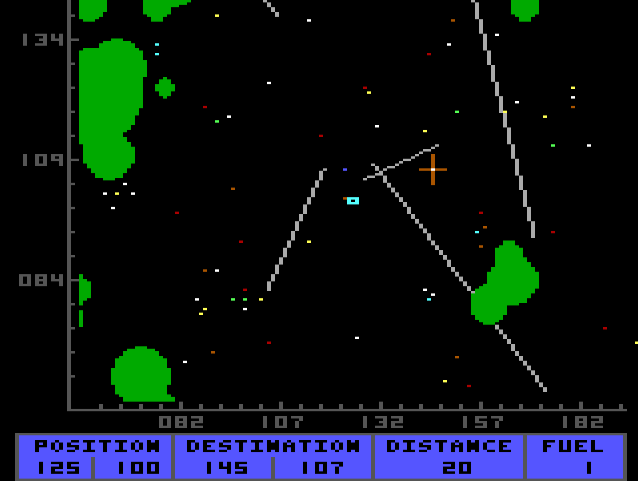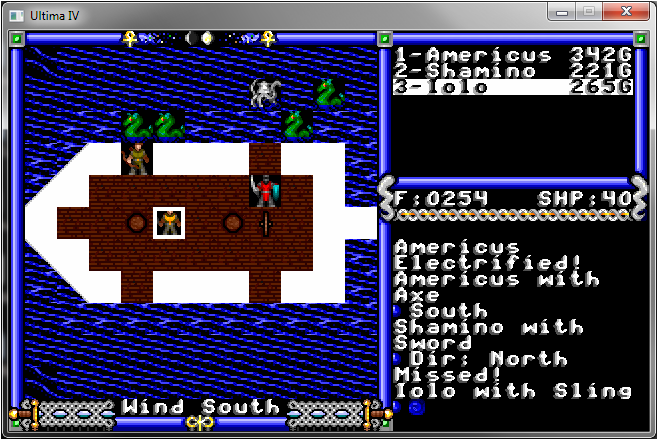Heihoo!
On aika juhlistaa 200. blogipostia todellisella mahtihaastattelulla. Kyseessä on Dwarf Fortressin tekijät Zach ja Tarn Adams. Zach piirsi kuvan ja Tarn vastaili kysymyksiin. Haastattelu on englanniksi, mutta mikäli tahtotilaa löytyy se myös käännetään suomeksi tahdon ilmaisujen mukaan (siis jos joku toivoo :). Jos joku lukija ei vielä tiedä, mikä on Dwarf Fortress, on aika ottaa selvää. Oppiskäyrä on jyrkkä, mutta palkinto odottaa. Joten ei muuta kuin syvään päähän täältä.
Meillä on myös uusi visuaalinen ilme ja täysin uusi Google+ ryhmä, joka on avoin kaikille tervetuloa. Google+ vaikuttaa varsin eloisalta roolipeliskeneltä, joten katsotaan saadaanko sinne jotain aikaan?
Laitetaan tähän vielä henkilökohtainen suosikki Dwarf Fortress tarina: The Hamlet of Tyranny
Enempiä viivyttelemättä haastatteluun:
IN ENGLISH:
It’s time to push things forward. We have a new visual look and we have a new Google+ group open for all, feel free to join in!
To celebrate our 200. blog post and good gameplay in general we’ve had the chance to interview the creators of Dwarf Fortress. Tarn Adams has answerd some question below and Zach has illustrated the interview with a crayon drawing. There are many interviews online about Dwarf Fortress and I wanted to ask questions not directly related to it. If you want to find out more about one of the most interesting games at the moment providing emergent gameplay don’t hesitate tojump right in! , the learnig curve is steep, but don’t let it get you, you will be rewarded!
Here is my favorite Dwarf Fortress story of all time: The Hamlet of Tyranny
With out further a due the interview:

PART I – Something to start with…
1. What was your first contact with tabletop role-playing games?
A: It was the Dungeons & Dragons red box, though I was too young to
try it. Zach tells me he messed around with it, but we didn’t
actually start playing until AD&D came out, which was also around the
time we got our Cyberpunk 2013 stuff. I remember reading through the
Immortal gold box stuff before we started playing too, so for some
reason we had all those boxes sitting around before we figured it out.
Reading rulebooks became a habit which lasted long after we drifted
away from playing. I’ve read a bunch of Rifts books and have never
even tried to play it. Same with Ars Magica — Zach and I ended up
reading most of the 5th edition books after running into one of them
at random.
2. Please share a little of your background as a tabletop role-player?
Your favorite character? Favorite system? Do you like to be a Dungeon
Master? etc.
A: We played AD&D and Cyberpunk with my brother’s friends starting at
around the same time. That was while I was in elementary school and
middle school, and then we played a little bit with a few friends
through high school. So I don’t have a broad experience with actually
playing different games and can’t really comment usefully on systems
— we certainly had more fun with Cyberpunk, and it’s one of the main
inspirations behind the sort of wound system you find in Dwarf
Fortress, or at least the initial push that had us add that sort of
thing to our early games. Zach and I switched off the Dungeon Master
role, and I don’t think either of us had a strong preference.
I don’t remember much about my characters now. I vaguely recall that
I had a fixer named Screwdriver that got shot in the head and was
dropped out of the game in a permanent coma, after establishing a
street gang. That was when I still lived in California, so I must
have been 12 or so.
3. What about computer RPGs? What are your first experiences with them?
A: It’s hard to remember exactly where that started, since I’ve been
around them as long as I can remember, and it depends on how you
define them. We always had roguelikes and other games that my father
downloaded from bulletin boards before I was able to play them. One
of the earliest ones I definitely remember having in a box was Ultima
3 from 1983 or so, though I probably didn’t attempt to play it for a
few years, and I don’t think we understood what was going on very
well. We also didn’t know how to keep saves after death, so we played
Ultima 3 with permanent death. I remember having our last party get
killed by wild horses in Ambrosia and being upset about it, since we’d
have to start back at the beginning. I don’t think we ever did.
4. Do you have a favorite computer RPG? What did you especially
enjoyed about it?
A: Since I’m not capable of narrowing it down further, I’d say it’s a
three-way tie between Ultima Underworld, Ultima 4 and Starflight.
Ultima Underworld I like in terms of atmosphere… it’s hard to
overstate how stunning it was at the time, not just with the
introduction of 3D graphics (with running and flying and swimming and
jumping in 3D before 3D shooters took off), but also equipment damage,
skill building, barter with anybody — then taking all of these
systems in play at once and having you locked underground and having
to survive down there. It gets somewhat weaker after the opening,
since there are some gamey quest areas, but I’ve never been more
immersed in a game than when Ultima Underworld was at its best.
Ultima 4 was fresh because the quest wasn’t about killing somebody or
even opposing some hostile power, and you could wander around freely
trying to figure out how to become the avatar. It had a relaxed “open
world” feeling. These two were the only Ultima games I went back to
complete as an adult.
Starflight is one of our favorite games because, even more than any of
the roguelikes, it let us see the diverse possibilities of procedural
generation as children, and in that way probably had more influence on
us than any other game. The Dwarf Fortress forgotten beasts can be
traced back right to Starflight’s generated lifeform descriptions.
5. What kind of part role-playing games have played in your life? How
would you describe their effect and importance (if any) to your life
so far?
A: The playing and making of games has always been tied up together
with us, and that includes the role-playing games as much as anything,
so I’d say they were formative and directly responsible for what my
brother and I ended up doing with our lives. We don’t play tabletop
games anymore, but we still read the books, and we still play some of
the computer games when we can, so they are still important, even if
we are mostly just working now.
PART II – The meaning of…
1. Dwarf Fortress is part of the MoMA collection, and for that it can
be defined as art. Do you see yourself being an artist? Or Dwarf
Fortress being a work of art?
A: I never thought about it that way, but the word “art” doesn’t pop
up in my thoughts in general. The games are just a thing we’ve been
doing.
2. Do you see games as art? What defines games as games, and as such
what defines games as art, or not as art?
A: I’ve been told that Dwarf Fortress is a toy instead of a game,
because it isn’t about winning and losing. I don’t have a working
theory of art or a claim of which, say, movies are covered and which
aren’t and which movies are “high art” and all that. As far as I can
tell, games can check most or all of the boxes that other media check,
and more, pretty much, so they can’t be easily dismissed, anyway,
without looking short-sighted, inexperienced or thoughtless.
3. What are your views on the relation between mathematics and games?
In what way can role-playing games benefit from mathematics for
example?
A: I’d just as soon keep math away from the games I play, though of
course there’s a difference between playing and designing, or
designing and programming. Familiarity with linear algebra is really
useful for all sorts of programming problems for instance, and
understanding probability can help you build up or choose mechanics
during design. We’re trying to keep numbers out of DF as much as
possible while you are playing though, since we think it’s harmful to
immersion, to some extent anyway.
4. How do you see randomization as part of storytelling? “The
emergence of a story”? The Open world/sandbox-experience?
A: When we started out, we were making games to play ourselves, so we
didn’t really have a choice but to let the little parts bump around
and see how it turned out. We never ended up getting into pre-written
stories for our own games even after we started releasing them, so
there are still lots of moving parts and rules. We try to help the
player piece together what’s going on from a narrative standpoint, but
people do that with their playthroughs naturally, with whatever game
they are playing. Once you open the world up, there are other issues,
like sparseness, measured against the amount of pre-generated content
and the diversity of randomized content, and there’s more room to
screw up in dealing with the consequences of player actions. We have
a long way to go there in Dwarf Fortress, since worlds are very
similar to each other in most ways, and what’s in a particular
location isn’t that interesting.
5. What do you see as the most important tools for creating a
interesting experience for the player, when considering the role of
game designer or a Dungeon Master?
A: Wikipedia! I don’t really have a list of third-party utilities or
anything like that. I grew up playing and making stuff before
utilities were easily accessible, and now I don’t know what’s out
there.
PART III – The Return of The
1. How do you see the future of gaming? Are games and/or playing them
changing and how, and to what direction in your opinion?
A: People seem to be using and inventing all sorts of devices, they
say VR is coming back, crowd-funding all over the place… I have no
idea what’s going to happen. I’ve never really tried to get out ahead
of things, and I just let myself be surprised. I think pretty much
everybody is playing games now, at least if they are young enough, and
there are getting to be more kinds of games for more kinds of people,
and the pool of potential developers of the future is that much
larger. I don’t know if every direction counts as a direction, in
terms of the question, but it’s cool to see. And there’s still my
luddite crap for thems that want it.
2. What are the best and the worst things Dwarf Fortress have brought
to your life? Has it made you smile? Has it made you curse?
A: I don’t really have anything big to complain about. I curse all
the time, but that’s an integral part of the bug-fixing process. It’s
great fun reading everybody’s stories, and the dwarf antics during
testing can also be fun. It’s nice to have the freedom to write the
game I want to write. On rare occasions, the fans give us beer and
coffee.
3. What are the benefits and pitfalls of a life as a game designer in
general? How do you see “the game industry”?
A: It’s a varied group of people, so it’s harder to generalize.
Somebody working at a large company or in school or one of those
co-ops is going to have a different set of concerns. For me, it’s
great to be able to work on the project I want to work on in more or
less the way I want. The main issue I’ve had is with scheduling too
much for a single release, I think, and in general there’s the problem
of handling your time if you want to work independently. I go through
a lot of different systems for doing that just to shake things up. I
don’t know very much about the game industry, and the output is so
vast that it’s hard to say one thing or another.
4. Do you see yourself working on games in the future? Do you have
plans for other games that you are working on or planning to work
upon? Could you see yourself doing something else than game designing?
A: Yeah, I’m going to be working on them for as long as I am able to.
Zach and I always have some side project or other going, but it’s
difficult to focus on any of them long enough to bring them to
fruition with the main project going full-bore. I gave math a shot,
and I don’t think I’m good enough at music to make a go at that… I
don’t have any other ideas about what I might do. Hopefully I’ll
never have to think about it.
5. If you could have any three wishes made true, what would they be?
A: The wish corruption game is one of the most popular on my forum, so
I think I’ll pass! Let’s just go for the continued health of the cat.
The rest will have to work itself out.




Mun puolesta saa suomentaa 🙂
Näin teemme! Hetkinen..
Käännös löytyy täältä:
http://iimu.kapsi.fi/limunropellukset/archives/2946